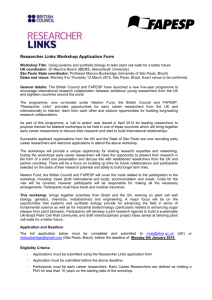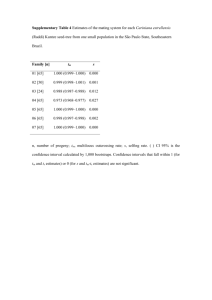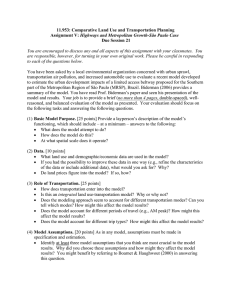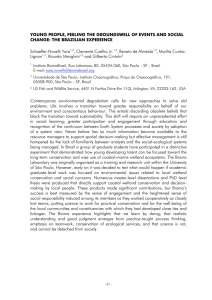DETAILED INSTRUCTIONS
advertisement
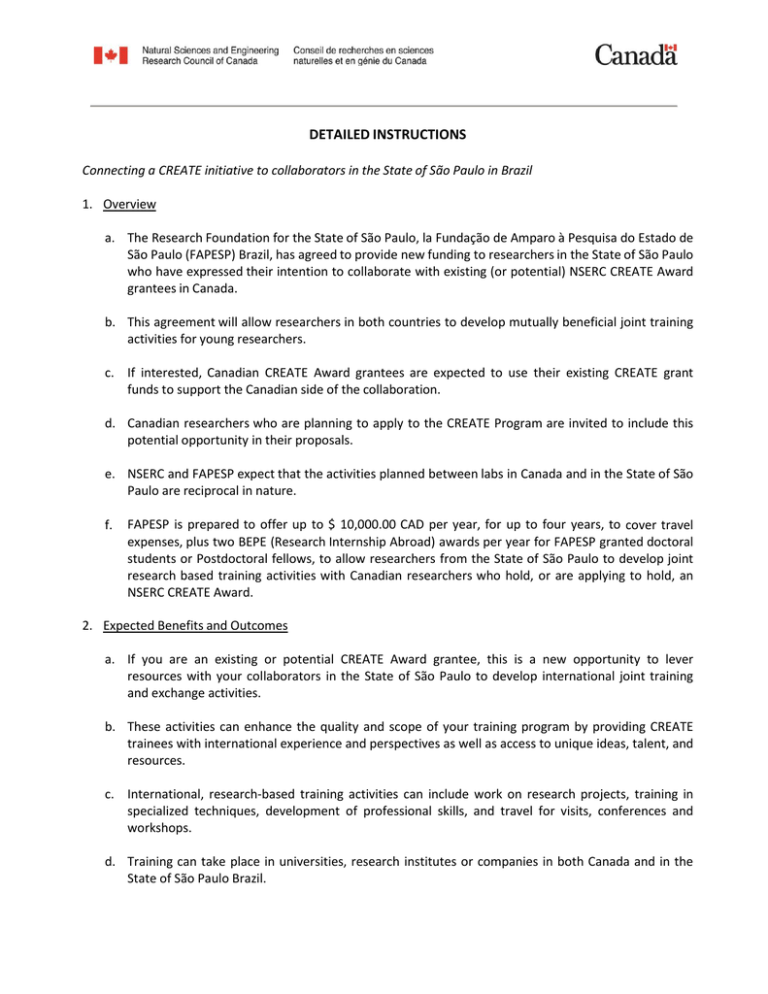
DETAILED INSTRUCTIONS Connecting a CREATE initiative to collaborators in the State of São Paulo in Brazil 1. Overview a. The Research Foundation for the State of São Paulo, la Fundação de Amparo à Pesquisa do Estado de São Paulo (FAPESP) Brazil, has agreed to provide new funding to researchers in the State of São Paulo who have expressed their intention to collaborate with existing (or potential) NSERC CREATE Award grantees in Canada. b. This agreement will allow researchers in both countries to develop mutually beneficial joint training activities for young researchers. c. If interested, Canadian CREATE Award grantees are expected to use their existing CREATE grant funds to support the Canadian side of the collaboration. d. Canadian researchers who are planning to apply to the CREATE Program are invited to include this potential opportunity in their proposals. e. NSERC and FAPESP expect that the activities planned between labs in Canada and in the State of São Paulo are reciprocal in nature. f. FAPESP is prepared to offer up to $ 10,000.00 CAD per year, for up to four years, to cover travel expenses, plus two BEPE (Research Internship Abroad) awards per year for FAPESP granted doctoral students or Postdoctoral fellows, to allow researchers from the State of São Paulo to develop joint research based training activities with Canadian researchers who hold, or are applying to hold, an NSERC CREATE Award. 2. Expected Benefits and Outcomes a. If you are an existing or potential CREATE Award grantee, this is a new opportunity to lever resources with your collaborators in the State of São Paulo to develop international joint training and exchange activities. b. These activities can enhance the quality and scope of your training program by providing CREATE trainees with international experience and perspectives as well as access to unique ideas, talent, and resources. c. International, research‐based training activities can include work on research projects, training in specialized techniques, development of professional skills, and travel for visits, conferences and workshops. d. Training can take place in universities, research institutes or companies in both Canada and in the State of São Paulo Brazil. e. This is also an opportunity for CREATE trainees to lay the foundation for future research collaborations and networks. 3. General Guidelines a. It is the responsibility of researchers in Canada and São Paulo to decide whether this opportunity is appropriate for their circumstances. It is also at the discretion of researchers to determine the specific collaborative training activities, including required resources and duration, as long as the activities are in line with the CREATE program objectives and guidelines on eligible expenses. See CREATE Program description. b. As mentioned above, Canadian CREATE award grantees are expected to use their existing CREATE award funds to support the Canadian side of the collaboration; researchers in the State of São Paulo will be eligible to access new funds from FAPESP. c. FAPESP will accept applications from researchers in São Paulo who have developed a joint, research‐based training plan with Canadian researchers that hold a CREATE award, as described in FAPESP’s Announcement for this collaboration. d. Applications to FAPESP can only be submitted by eligible researchers in the State of São Paulo and must include the written consent (in letter format) of a Canadian CREATE Investigator. 4. Reciprocity a. Brazilian Researchers in the State of São Paulo are expected to provide appropriate and reciprocal opportunities for Canadian students and fellows who travel to the State of São Paulo, Brazil to pursue research‐based training activities under this agreement. b. Canadian researchers are expected to provide appropriate and reciprocal opportunities for Brazilian students and fellows from the State of São Paulo who travel to Canada to pursue research‐based training activities under this agreement. c. FAPESP will fund researchers, students and fellows from the State of São Paulo, and NSERC will fund Canadian researchers, students and fellows, each according to its own regulations and practices. 5. Detailed Instructions for Existing CREATE Award Grantees a. Decide whether the opportunity is suitable for the existing CREATE initiative, including the resources and time required to establish reciprocal international, research‐based training activities with collaborators from the State of São Paulo. b. Discuss the opportunity with existing collaborator(s) or newly established collaborator(s) in the State of São Paulo, Brazil; the specific joint, research‐based, training activities as well as their duration and frequency are at the discretion of researchers as long as they do not exceed FAPESP’s guidelines for this agreement or go against the objectives of the CREATE program. c. Once both sides have agreed on the parameters of the collaboration, researchers in Canada will develop a brief joint plan (maximum 2 pages) that will be submitted to NSERC for review. Researchers from the State of São Paulo will submit to FAPESP a corresponding grant proposal, as described in the FAPESP announcement. 2 d. Information required by NSERC: • The joint plan should provide an accurate description of proposed training activities and must be in line with the CREATE Program Objectives and Description. • The joint plan submitted to NSERC may be a shortened version of the proposal that researchers in the State of São Paulo submit to FAPESP; a brief description of how the collaboration will benefit the funded CREATE Initiative is expected. • If the joint plan causes a deviation from what was proposed in the funded CREATE award, a revised plan for the research and training activities, as well as a detailed related budget, must be submitted to NSERC by email to CREATE@nserc‐crsng.gc.ca • NSERC will evaluate the joint plan to ensure it meets the CREATE program objectives and guidelines. • FAPESP will conduct a review on the joint, research‐based training plan submitted to FAPESP, according to FAPESP’s guidelines and eligibility criteria and will make a decision about funding the São Paulo component of the joint plan within 90 days. e. This opportunity does not involve simultaneous joint peer review. FAPESP will only conduct peer review on applications from researchers in the State of São Paulo if their Canadian collaborators have secured funding through NSERC’s CREATE program. 6. Detailed Instructions for Researchers in Canada Planning to apply to the CREATE program a. Decide whether the opportunity is suitable for the planned CREATE initiative including the resources and time required to establish reciprocal, research‐based training activities with collaborators in the State of São Paulo. b. Resume existing connection(s) or establish a new connection with researcher(s) in the State of São Paulo, Brazil; the specific joint training activities, as well as their duration and frequency are at the discretion of researchers, as long as they do not exceed FAPESP’s guidelines for this agreement or go against the objectives of the CREATE program. c. Once both sides have agreed on the parameters of the collaboration, researchers in Canada will develop a brief joint plan (maximum 2 pages) that will be submitted to NSERC for review. The brief joint plan submitted to NSERC may be a shortened version of the proposal that researchers in the State of São Paulo will eventually submit to FAPESP if the CREATE proposal advances to the application stage; a brief description of how the collaboration will benefit the funded CREATE initiative is expected. d. For new initiatives, the brief joint plan must be submitted to NSERC as part of the CREATE Letters of Intent (LOI) Stage, signifying the intention of researchers in the State of São Paulo to collaborate with Canadian researchers providing the CREATE application is successful. FAPESP will delay reviewing the full application until the results of the NSERC CREATE Phase 1: Letter of Intent (LOI) are known (June) e. If the CREATE applicant is invited to submit an application, the brief joint plan must be included 3 again and should include a ‘letter of commitment’ from researchers in São Paulo, highlighting clear commitment of support (e.g., costs for stipends and travel, in‐kind support, training facilities,) even if this commitment is conditional on receiving funds from FAPESP. f. If the CREATE applicant is invited to apply to Phase 2: Application, FAPESP will conduct a peer review of the joint research‐based training plan submitted to FAPESP, according to FAPESP’s guidelines and eligibility criteria, and will make a decision about funding the São Paulo component of the joint training plan within 90 days. FAPESP funding will be conditional on the success of the CREATE award. Final results of the 2013 CREATE competition are expected in March 2014. 4
